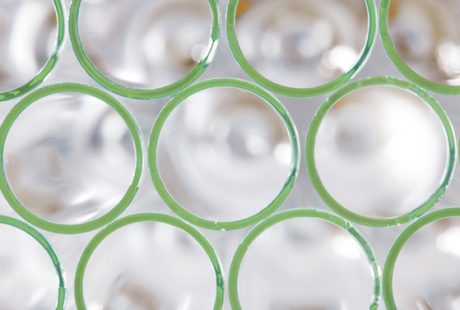We use cookies to personalize content and advertisements, to offer social media functions and to analyze access to our website.
You can revoke the given consent at any time. You can find further information in our Privacy Policy.
Dec 2016
On 16, Dec 2016 | In News @en | By Alisa Maier
The EU Commission has published on November 30, 2016 the new Ecodesign Working Plan 2016 to 2019. It sets out the Commission’s working priorities under the ecodesign and energy labelling framework. The new Ecodesign Working Plan also contributes to the Commission’s new initiative on Circular Economy and the further improvement of resource efficiency.
According to the new Working Plan, ecodesign should make a much more significant contribution to the circular economy in the future, for example by more systematically tackling material efficiency issues such as durability and recyclability. Also the possibility to repair, remanufacture or recycle a product and its components and materials depends in large part on the initial design of the product.
Besides the review of existing Regulations, the Commission will be launching dedicated studies for those products that have the largest savings potentials. In this context, the Commission had launched a study to identify any further energy-related product groups that had significant savings potential and had not been included in the transitional period or in the previous working plans. Additionally, from a circular economy perspective, a qualitative assessment of other environmental impacts mentioned in the Ecodesign Directive was made. Product groups in scope of further preparatory studies are:
• Building Automation and Control Systems
• Electric kettles
• Hand dryers
• Lifts
• Solar panels and inverters
• Refrigerated containers
• High-pressure cleaners
Given their specificity, a separate track is proposed for ICT products (not included in the product groups above), that will also fully take into account their circular economy potential, which is particularly relevant in the case of mobile/smart phones. The following ICT products might be included in the Ecodesign Working Plan:
• Gateways (home network equipment)
• Mobile/smart phones
• Base
Link to EU Ecodesign Working Plan 2016-2019: http://ec.europa.eu/DocsRoom/documents/20375
Dec 2016
On 05, Dec 2016 | In Copyright Levies, News @en | By Alisa Maier
 Already one year ago, on October 1, 2015, Austria’s Copyright Act Amendment 2015 entered into force. The major amendment was the introduction of copyright levies on digital storage. Five month later, in March 2016, collecting societies and industry associations finally agreed on tariffs for storage media and devices newly in scope ranging from as little as EUR 0.35 for memory cards up to EUR 5.00 for computers. These tariffs are applicable retroactively from October 1, 2015.
Already one year ago, on October 1, 2015, Austria’s Copyright Act Amendment 2015 entered into force. The major amendment was the introduction of copyright levies on digital storage. Five month later, in March 2016, collecting societies and industry associations finally agreed on tariffs for storage media and devices newly in scope ranging from as little as EUR 0.35 for memory cards up to EUR 5.00 for computers. These tariffs are applicable retroactively from October 1, 2015.
However, there are claims for levies on these products for considerably longer retroactive periods. Therefore negotiations had to be continued for the period up to September 30, 2015. It took negotiating partners another 2 months to find an agreement for periods between 2012 and 2015. Although the rates are quite similar (there is no tariff for memory cards, digital picture frames and smart watches), they are applied retroactively for devices sold as of January 1, 2013, January 1, 2012 for mobile phones respectively.
Moreover, Austrian collecting society Austro-Mechana (AUME) has published a list of “compliant” companies. This so called whitelist is in line with paragraph 1.6 of the contract between collecting societies and industry. Contractors on this list have registered, reported and paid copyright levies in time.
For more information regarding the general agreement, the framework contract or the list of compliant companies, please contact us at contact@1cc-consulting.com.
Nov 2016
The correct collection and treatment of used EEE becomes an important topic in an increasing number of African countries:
Cameroon, Nigeria, Madagascar and this summer also Ghana, have already enacted WEEE legislations. However, official publication of the Ghanaian Hazardous and Electronic Waste Control and Management Bill, a precondition for its entry into force, is still pending. The Bill implements the Basel Convention and introduces the obligation for producers to register with the Environmental Protection Agency and to pay an eco-levy for EEE placed on the market.
In South Africa, only recently a Legal Notice to the Waste Act was published, informing the public about newly drafted rules requiring the electrical and electronic and the lighting industry to prepare and submit industry waste management plans. This draft also contains the obligations for responsible parties to register with competent authorities.
Four further African countries are currently developing management plans or legislation to cover the proper collection and treatment of WEEE: Kenya, Rwanda, South Africa, and Tunisia.
Nov 2016
The EU Parliament has adopted amendments to the proposal of the European Parliament and of the Council setting a framework for energy efficiency labelling and repealing Directive 2010/30/EU. Members of Parliament voted on the proposed rescaling of labels in order to ensure a homogeneous A to G scale, the introduction of a product database as well as stronger market surveillance.
Rescaling of labels
The Parliament agreed that the Commission shall introduce rescaled labels for existing product groups within five years after the entry into force of the Directive. According to the Parliament, any future rescale shall aim for a validity period of at least 10 years. In future, the criteria triggering rescaling procedures shall be:
• 25% of the products sold within the EU market fall into the top energy efficiency class A; or
• 50% of the products sold within the EU market fall into the top two energy efficiency classes A+B.
Product Database
The product database shall provide information on energy-related products covered by the Directive both for customers and market surveillance authorities: Customers will be able to access the database via a public interface, organised as a consumer-oriented website. An electronic platform with clearly specified accessibility and security requirements shall be accessible for national market surveillance authorities.
Market Surveillance
In order to strengthen market surveillance, national market surveillance authorities shall do physical product testing which covers at least one product group per year. By January 1, 2018, Member States will have to establish a national market surveillance plan.
Nov 2016
 In the Eurasian Economic Union (EEU), the final draft Technical Regulation on the “Restriction of the use of hazardous substances in electrical and electronic equipment” RoHS was published. The EEU is the former Customs Union (CU), an economic union of currently five countries of the former Soviet Union, among them e.g. Russia, Kazakhstan and Belarus.
In the Eurasian Economic Union (EEU), the final draft Technical Regulation on the “Restriction of the use of hazardous substances in electrical and electronic equipment” RoHS was published. The EEU is the former Customs Union (CU), an economic union of currently five countries of the former Soviet Union, among them e.g. Russia, Kazakhstan and Belarus.
The forecasted date of entry into force of the EEU Technical Regulation on RoHS is March 1, 2018. The current draft TR on RoHS follows in two relevant parts the EU RoHS Directive 2011/65/EU: It stipulates substance restrictions for Lead (0,1 %), Mercury (0,1 %), Cadmium (0,01 %), Hexavalent Chromium (0,1 %), Polybrominated biphenyls, PBB (0,1 %) and Polybrominated diphenyl ethers PBDE; (0,1 %) and foresees the same thresholds. The four phthalates DEHP, BBP, DBP and DIBP, which are restricted in the EU beginning with July 22, 2019, are not regulated by this Draft TR.
However, there are significant differences regarding product scope, definitions, exemptions from substance restrictions and labelling requirements. In addition, before placing a product in scope on the EEU market, a specific conformity assessment has to be conducted and registration is required.
For more information, please contact us at contact@1cc-consulting.com.
Nov 2016
On 11, Nov 2016 | In News @en | By Alisa Maier
 The German Federal Ministry of Environment (BMUB) is currently working on a draft for a new Packaging Law, which will repeal the Packaging Ordinance. Besides some new definitions which are intended to clarify terms of the law and higher collection and recycling targets, the current draft foresees some major changes in how the system for packaging will be administered in future:
The German Federal Ministry of Environment (BMUB) is currently working on a draft for a new Packaging Law, which will repeal the Packaging Ordinance. Besides some new definitions which are intended to clarify terms of the law and higher collection and recycling targets, the current draft foresees some major changes in how the system for packaging will be administered in future:
The draft contains the set-up of a central authority (similar to the function of stiftung ear, the German WEEE producer register). It will manage the newly demanded registration for packaging in Germany and will be in charge to administer a Declaration of Completeness.
Impact on producer obligations
With the numerous changes proposed, producers will have to face new requirements, such as registration in the public register for packaging with the new central authority and submission of an annual Declaration of Completeness – even producers who do not meet the current annual thresholds for such declaration will have this obligation in future. Furthermore, the pricing structure of recycling fees will change, as the draft foresees fees based on recyclability of packaging.
A final draft of the law is not expected before early 2017.
For more information, please contact us at contact@1cc-consulting.com.
Nov 2016
On 11, Nov 2016 | In News @en | By Alisa Maier
 The German Federal Ministry of Environment (BMUB) is currently working on a draft for a new Packaging Law, which will repeal the Packaging Ordinance. Besides some new definitions which are intended to clarify terms of the law and higher collection and recycling targets, the current draft foresees some major changes in how the system for packaging will be administered in future:
The German Federal Ministry of Environment (BMUB) is currently working on a draft for a new Packaging Law, which will repeal the Packaging Ordinance. Besides some new definitions which are intended to clarify terms of the law and higher collection and recycling targets, the current draft foresees some major changes in how the system for packaging will be administered in future:
The draft contains the set-up of a central authority (similar to the function of stiftung ear, the German WEEE producer register). It will manage the newly demanded registration for packaging in Germany and will be in charge to administer a Declaration of Completeness.
Impact on producer obligations
With the numerous changes proposed, producers will have to face new requirements, such as registration in the public register for packaging with the new central authority and submission of an annual Declaration of Completeness – even producers who do not meet the current annual thresholds for such declaration will have this obligation in future. Furthermore, the pricing structure of recycling fees will change, as the draft foresees fees based on recyclability of packaging.
A final draft of the law is not expected before early 2017.
For more information, please contact us at contact@1cc-consulting.com.
Sep 2016
1cc GmbH organizes two new webinars related to REACH and Take-Back of Batteries.
Both webinars will be offered in English. Please find below further information:
Title: REACH 2018 – How to Determine and Handle Your Registration Obligations Easily
Date: Tue, Oct 4, 2016 5:30 PM – 6:30 PM CEST
Speaker: Nadiia Kaiun, Consultant at 1cc
Sign up: https://attendee.gotowebinar.com/register/6095035333585531139
Title: Environmental Compliance for E-Bikes – Focus on Take-Back of Batteries
Date: Wed, Oct 12, 2016 3:00 PM – 4:00 PM CEST
Speaker: Solveig Legler, Senior Strategy Manager at 1cc
Sign up: https://attendee.gotowebinar.com/register/5197266497588530947
PS: Participation in these 1cc webinars is free. However, the number of participants in each webinar will be limited to 20 attendees.
Looking forward to your participation!
Sep 2016
On 12, Sep 2016 | In Events | By Alisa Maier
The ICBR is the international platform for discussion of the latest developments and the challenges of battery recycling, bringing together many decision makers in the battery recycling chain such as battery producers, recyclers, collection schemes, policy-makers, transport companies and many more. The congress takes place September 14 – 16, 2016 in Antwerp, Belgium.
1cc consultant Marc Pieper will give the presentation “Removability requirements for batteries and the impact on product design” on Thursday, September 15, 2016 at 09.30 pm.
Further Information: www.icm.ch/icbr-2016
Sep 2016
On 05, Sep 2016 | In Events | By Alisa Maier
The upcoming Electronics Goes Green Conference 2016 is an outstanding event for the growing global community of scientists, product developers, and business managers working on the task of improving the environmental properties of technologies and products along the value chain of the electronics and ICT industry. The conference will take place from September 7 – 9, 2016 at Seminaris Campus Hotel in Berlin, Germany.
1cc Senior Consultant Eva Hink will give the presentation “Challenges and Difficulties Deriving from Extension of Annex II of the RoHS Directive” on Friday, Sept 9, 2016 at 8:30 am.
At the same day, Stefanie Enders, Legal Counsel at 1cc GmbH, will give a speech on “WEEE Legislation in Africa – Status and Future Developments” at 13:30 pm.
Furthermore, she will provide an insight into “WEEE Legislation in Africa – Status and Current Development” during the poster session slots on:
Sept 7, 2016 3:30 – 4:30 pm
Sept 8, 2016 3:00 – 4:00 pm
Sept 9, 2016 12:30 – 1:30 pm
We are looking forward to meeting you!
Further information: http://electronicsgoesgreen.org